Mayor Offers Balanced Budget — But At What Cost?
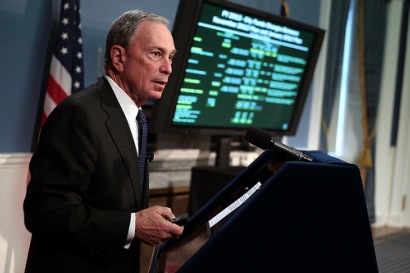
NEW YORK — Mayor Michael Bloomberg has proposed a $70.1 billion budget, the last of his administration, with no new taxes or layoffs and the costs of the recovery from Hurricane Sandy expected to be repaid by the federal government.
But some experts warned that the preliminary budget announced on Tuesday fails to set aside a sufficient reserve to settle expired labor contracts, which could lead the next mayor to make tough decisions about service cuts and tax increases. They say the budget also makes risky bets on one-shot sources of funding.
The nonprofit Citizens Budget Commission has called the unsettled labor contracts the biggest risk to the budget. "What you are looking at is a potential very, very big hit to the budget," said Maria Doulis, an analyst with the organization.
The Independent Budget Office has said settling the contracts could cost the city billions of dollars.
Overall, the mayor struck a note of growing optimism about the city's financial future, with revenues expected to increase modestly, with Wall Street rebounding and the local economy diversifying.
"We've done a lot," the mayor said. "We've gone through Sandy, we've gone through Irene, we've gone through a mortgage crisis, and yet with all of those things, the city's budget is still in balance."
But fiscal policy experts warned the budget takes risks by relying on the sale of a new class of taxi medallions for additional revenue and a $1 billion drawdown from a health insurance trust fund, which would deplete it. Bloomberg's budget forecasts $600 million in revenue from the medallion sale, which has been frozen after current cab owners sued to stop it.
Observers have long warned that patching up the budget using a one-shot revenue source like the sale of taxi medallions was troublesome.
The IBO also warned in December after the mayor first announced that the city would not be burdened by the cost of Sandy aid "may prove to be a risky assumption."
"The possibility that the city will indeed have to shoulder some of the cleanup and recovery costs — as well as expenditures to mitigate devastation from future storms — remains very real," the IBO said.
The budget estimates $4.5 billion in Sandy-related costs.
In his announcement Tuesday, Bloomberg also said the city stands to lose out on hundreds of millions in state education aid because of the failure to reach an agreement over teacher evaluations with the United Federation of Teachers. The city is already expected to lose $250 million in such aid, which will lead to the loss of 700 teacher positions this year.
He went to Albany on Monday to call on state lawmakers to stave off the loss of state education aid, saying the UFT's demands were untenable and would be "a fraud on the public."
“My message today is simple: Do not punish our schoolchildren for the obstructionism of the UFT. Our children don’t deserve it. They have done nothing wrong," his testimony read. "They just need a quality education to survive in an ever more global and competitive world, and they can only get that with qualified teachers at the front of the room."
The UFT has blamed the mayor for the breakdown in negotiations. "Just as we reached a tentative agreement with the DOE, Mayor Bloomberg scuttled it and once again turned his back on our schools," said UFT President Michael Mulgrew in testimony.
The loss of teacher positions and other proposed cuts to services are expected to be at the center of budget negotiations involving the Bloomberg administration, the City Council, policymakers and advocates.
“This Council is committed to reaching a responsible, balanced budget that protects the vital services New Yorkers depend on," Council Speaker Christine Quinn said in a statement after the mayor's announcement. "We look forward to working with Mayor Bloomberg to ensure that a fair and balanced budget is reached on time and truly meets New Yorkers’ needs."
As expected, soon after the budget was announced, advocates, mayoral candidates and other elected officials began weighing in on the mayor's proposal.
City Comptroller John Liu, who is expected to run for mayor, faulted the Bloomberg administration's "negotiating strategy" on teacher evaluations for losing the badly needed state education funds.
The Campaign For Children, an advocacy organization, said Bloomberg was proposing to roll back the same cuts to after school and other programs that were restored in last year's budget.
Public Advocate Bill de Blasio, who announced Sunday he was running for mayor, tweeted: "Yet again, early ed & after-school programs are on chopping block, upending lives & leaving NYers scrambling. It's no legacy to be proud of."
Another mayor hopeful, Bill Thompson, said the Bloomberg administration had pursued the "wrong fiscal policies."
"Mayor Bloomberg’s failure to work with labor unions and drop cooperation in favor of name-calling and vitriol has been harmful to our city; one need look no further than these budget problems," he wrote in a statement.
The preliminary budget will be followed by an executive budget, a budget negotiation in June, and then an update in the fall.
___
Image by Edward Reed, courtesy of the mayor's office.
Council Passes Bill To Increase City Contracts For Minority Businesses
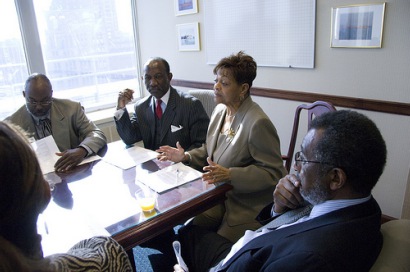
NEW YORK — Londel Davis' Harlem-based company has contracts to service fire extinguishers with some of the city's largest agencies, including the Department of Education.
But in spite of his success, Davis, who is black, says it's far more common for him and other minority business owners to get rejected when they bid for city contracts. And he says he doesn't really know why that is.
"It might have been our bid was too low," he said. "We might not have had a piece of a document."
The City Council approved a bill yesterday that would revise Local Law 129, passed in 2005, which was supposed to increase opportunities for minority and women-owned businesses to get contracts from the city. Among other enhancements, the new bill would add a greater level of accountability and eliminate a $1 million contract cap.
Local Law 129 had set targets for city agencies to contract minority and women-owned businesses for certain sectors, including construction, architectural and engineering, as well as services and goods.
But the law had been criticized for failing to do its job because of its lack of enforcement and effectiveness. There were also complaints that, because of the $1 million cap, only 15 percent of the billions of dollars worth of city contracts had been subject to the law.
An analysis of the program under Local Law 129 by the mayor's Office of Contract Services this year found that "disparities still exist" between the number of minority and women-owned business enterprises and "the extent to which they are performing city contracting work."
Minority and women-owned business enterprises had about 3.1 percent of the share of eligible city contracts for most of 2012, according to data on the city Comptroller-run site M/WBE Report Card NYC.
In announcing yesterday that the Council would pass Intro 911, the update to Local Law 129, Speaker Christine Quinn said in remarks to the press: "It really became clear, crystal clear, that we needed to do more to ensure that [minority and women-owned business enterprises] got their fair share in the city procurement process."
Michael Bloomberg praised the decision by the Council, strongly suggesting he would sign it into law. "These measures are an important part of diversifying our economy," he said.
Not everyone has been enthusiastic about Intro 911. Some Hispanic business groups were disappointed that it lowers procurement goals for Hispanic-owned construction companies from 9 percent to 4 percent, the Village Voice has reported.
"We're very disappointed with this decision," Frank Garcia, chairman of the New York State Coalition of Hispanic Chambers of Commerce, told the Voice. "We thought that they would at least negotiate with us to give us a higher percentage."
City officials have emphasized that the goals are aspirational, not a quota. The participation goal for blacks in the construction sector was also decreased from 12.63 percent to 8 percent in the new bill.
Besides updating the participation goals, Intro 911 makes a number of revisions and enhancements to Local Law 129, among them the elimination of the $1 million cap and a provision establishing an accountability program, M/WBEStat, modeled loosely after the New York Police Department's method of analyzing crime statistics.
M/WBEStat would require agencies to report their progress toward participation goals to a high-ranking city official.
Davis, who started American Fire Control in 2007 and says his company services 15,000 to 25,000 extinguishers a week, said he was keenly interested in the accountability measure that has been added to the local law through Intro 911 because it adds a level of enforcement that didn't exist before.
He said this could help make the process of bidding for city contracts more fair. "We would all like equal opportunity like everyone else," he said.
___
Image of City Council business breakfast summit, courtesy of the Council.
Advocates Send Thanksgiving Message Calling For Hike In Minimum Wage
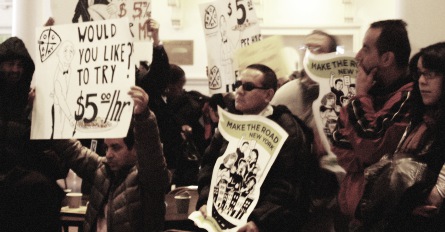
NEW YORK — Earlier this week, at the Church of the Holy Apostles in Chelsea, about 50 people waited in line with cafeteria trays to have an early Thanksgiving lunch consisting of an apple, hot sandwich and cider.
As they came to the end of the line, they were asked to sign a card appealing to New York State Senators to pass legislation to raise the minimum wage by $1.25 to $8.25.
It is unclear whether politicians will be listening to the message as they head into the holiday weekend.
Minimum wage was supposed to be on the agenda for a special session of the state Legislature this winter and it was a popular talking point across the state during this month’s elections.
But many lawmakers are now focused on recovery from Hurricane Sandy and prospects for a special session are growing slimmer by the hour. Control of the State Senate is also in chaos and the popular governor, who could push lawmakers into a deal, has waffled on whether a hike in the minimum wage is politically feasible at this time.
In spite of the dimming hopes for minimum wage, activists and spiritual leaders who gathered Monday at the Church of the Holy Apostles, home of the largest emergency soup kitchen in New York City, were undeterred. They had chosen Thanksgiving Week to time the launch of their statewide campaign to call on legislators to pass minimum wage legislation, bringing together activists, spiritual leaders and unemployed New Yorkers.
Mark Dunlea, executive director of Hunger Action, which helped organized Monday’s event at the Manhattan church, said the hurricane was no excuse for putting off a special session or a minimum wage hike.
“We should have a special session and fill a gymnasium in Queens,” Dunlea said, referring to one of the hardest-hit regions in the city. “Get all the legislators down there, have them pass the minimum wage hike and everyone can help out with Occupy Sandy and see what really is going on.”
Sen. Joe Addabbo, who represents some of those hard-hit parts of Queens, said he would like to go back to Albany to do “the people’s work” — including passing legislation to increase the minimum wage.
“The governor can force us to go there, but he can’t force us to do work and that is unfortunate,” he said. “I thought we would be back in Albany and addressing important legislation. The time frame on the minimum wage is flexible. If we had to wait to January and the Democrats are in charge we will pass it then, if it has to wait til January and the Republicans are in the majority we will have to be a loud voice for it. But I really thought we would be back in December to work on this.”
In front of the soup kitchen’s altar, religious leaders, community advocates and unemployed residents gathered around a roundtable, passing a microphone to amplify the message.
The Rev. Raymond Rivera, president of the Latino Pastoral Action Center in Brooklyn, said it would be absurd to increase legislator’s wages while the minimum wage remains at $7.25. “Before you raise your own salaries, first deal with minimum wages,” he said, referring to pay raises for legislators that was also expected to be discussed at a winter special session.
But some business groups and legislators say hiking the minimum wage would kill jobs in the state.
Ken Pokalsky, of the Business Council of New York, said his group thinks a wage hike could cost jobs.
“We estimate the minimum wage hike that has been talked about would cost about $2,900 per job. Our point is: Don't create jobs by increasing cost of labor. If you increase the cost of something, whether it is labor or gasoline, people are going to buy less of it,” he said.
Pokalsky pointed to a 2008 study by Cornell professor Richard Burkhauser that estimated a minimum wage increase in New York would cost 16,000 jobs, and that only 20 percent of the benefits achieved by a hike would go to poor households. “The money comes from somewhere,” Pokalsky said. “Maybe you increase prices, maybe you have fewer jobs at a higher wage, maybe less investment elsewhere or maybe you are making no money.”
A recent study by the office of state Sen. Jeff Klein disputed that notion, finding that a hike would increase wages for over one million workers, generate $600 million in new consumer spending and translate to over 5,000 new full-time jobs.
Business For a Fair Minimum Wage, which counts Costco and the Greater New York Chamber of Commerce among its members, also touts research that says raising the minimum wage does not cause job loss.
Dunlea, meanwhile, has his attention focused on Cuomo, since the governor declared a minimum wage hike was politically dead this summer after the Assembly passed Speaker Sheldon Silver’s bill to increase the minimum wage. The Senate did not take up the measure.
Cuomo has immense political clout and high approval ratings from voters, but even if the governor came out in full support of a hike he would need to get the State Senate to pass the legislation and it isn’t quite clear at the moment who will control the chamber come January.
Cuomo supported a number of Republican Senators but his endorsements were not enough to protect their majority after Democrats picked up at least three seats. Now recounts and backroom deals will decide whether Democrats or Republicans control the chamber.
Senate Democrats have made raising the minimum wage part of their general platform — Mike Gianaris, head of the Senate Democratic Campaign Committee, has touted his conference’s support for a wage hike all year, while Senate Republicans have generally opposed the hike.
“Whether this is addressed in a special session or in January, I believe our candidates won with this across the state,” said Democratic state Sen. Gustavo Rivera, of the Bronx. “But we have to think about the recovery of the state, so I defer to the governor and the people who were hurt by the storm about when it is done. But I believe this is the reason why we need to be in the majority. It is clear we have a mandate. We got more votes than Republicans across the state and we won talking on these issues.”
Senate Majority Leader Dean Skelos called a minimum wage hike a “jobs killer” and said that a hike would hurt small businesses. Meanwhile, news reports indicate that the Independent Democrats have made a hike in the minimum wage part of their platform and will only back a a Majority Leader who intends to bring the measure to a vote. The four legislators are being courted by Republicans and Democrats.
But the political wrangling means very little to those gathered at the Church of Holy Apostles. For some, making any amount of cash is a challenge.
Willard Grant, 30, is from Jamaica, Queens, and has been unemployed for several years and is a regular at the Church of the Holy Apostles soup kitchen. Grant has been living in a Port Washington shelter for six months. “I’m not proud. It’s sad, shameful, and embarrassing but I’m taking things one step at a time,” he said.
He has been moving from shelter to shelter because he doesn’t like being on the streets.
Grant says he lost many friends and family members when he began staying at the shelter but explains he does not like asking people for things or relying on others for money.
Two and a half years ago, he lost his job as a stockboy lifting boxes into Jack’s 99 cent store for minimum wage and needed to work other off-the-book jobs because he said his salary was not enough to pay rent.
Now Grant says he rides his bicycle throughout all five boroughs doing athletic tricks and entertaining moves to keep others in shape. “Sometimes people give me money, but I don’t always like to accept,” he said.
Monday’s event to launch the statewide call for an increase in the minimum wage ended with a prayer from a religious leader asking to “turn the heart of our state legislators” and “hear God’s cries for social and economic justice.”
___
Photo of activists at Church of Holy Apostles by Bridget Woznica.
Study seeks to help local food producers improve distribution

Photo courtesy Flickr/rachelkramerbussel
NEW YORK – Eight months ago, Bob McClure, the co-owner of McClure's Pickles in Brooklyn -- purveyor of all kinds of preserved cucumbers in flavors ranging from chili-spiked to garlic dill -- decided to start a distribution cooperative.
His company used one delivery van to distribute the products of other local, smaller manufacturers for a rental fee, with the idea it would help the companies reach more retailers. The companies would upload their invoices to a website and distribute their products together in the hopes of forming a collective pool of clients.
But he said eventually the amount of products made the delivery process too expensive and he had to discontinue the distribution cooperative.
“There is a need for development on a larger scale complete with warehousing, staff, and marketing," McClure said.
Food distribution might not be exactly glamorous, but for many small companies it is a critical link between success and failure. Now the City Council is funding a study by the Pratt Center of Community Development that Speaker Christine Quinn says aims to find ways to “unlock the economic potential of our local food economy."
The study will look at local city food manufacturers – a $5 billion industry that employs over 14,000 workers.
"This commercial sector has remained a bright spot throughout the recession and has established itself as a hotbed of economic activity in the city," Quinn said in a statement announcing funding for the study earlier this week.
She first announced the idea for the food distribution study in a speech before the Association for a Better New York last fall.
Adam Friedman, the director of the Pratt Center for Community Development, said there are "hundreds of food manufacturers scattered around the city, making it a complex network.”
Friedman said the study, which has already started and will involve talks with dozens of local food manufacturers, would look at how to “improve competitiveness within the business environment for local food companies in New York City and reduce the environmental impacts of vehicle emissions in traffic.”
He said there was a lot of redundant food trucks that go to grocery stores and that one main goal of the study is to find ways for local food manufacturers that deliver to the same groceries in Manhattan to “maximize their benefits."
He said the co-op McClure organized for fellow local food manufacturers is one example of that model.
Friedman said the study will also examine ways to exchange information between producers and stores.
“You can get a lot of insightful market information from the grocer, such as price points, competition, and suggestions," he said.
The study, scheduled to be completed by June 2013, will also look at how small companies looking to export their goods can get their products to new markets and gain access to trade shows.
A 2007 study titled “More Than a Link in the Food Chain” conducted for the mayor's office by the the Fiscal Policy Institute and the New York Industrial Retention Network (now a project of the Pratt Center) revealed that local food manufacturers export a total of 34 percent of sales or $1.6 billion to companies outside the city.
The top foods exported were soft drinks and specialty foods, such as chocolates, nut products, frozen food, ethnic foods and spices, the study reported.
Daniel Sklaar, the owner of Fine and Raw Chocolate, said he started off distributing his confections on the subway, then later graduated from bicycle to truck. He also joined McClure's co-op when it was around, and also began shipping his products.
He said he would like to see the study focus on the challenges local food manufacturers have with overseas distributors.
“It’s very challenging. Essentially you have to deal with rigorous amounts of paperwork and logistics, shipping, and international brokerage," he said.
NYC child care programs restored in $68.5B budget
NEW YORK — Mayor Michael Bloomberg and the City Council agreed on a $68.5 billion budget that restores funding for popular child care programs, while assuming the city will reap hundreds of millions of dollars in revenue from the sale of taxi medallions.
The agreement on the 2013 fiscal budget was announced by Bloomberg and Council Speaker Christine Quinn at City Hall earlier tonight.
The two posed, shook hands and kissed each other on the cheeks in front of a room full of reporters and cameras.
The announcement brought to an end the so-called "budget dance" where the mayor and the Council negotiate the spending priorities for the fiscal year that begins July 1.
Quinn, who hopes to become the city's next mayor, said the budget agreement was a statement of values. "With this budget I think all of us in City Hall have made clear that the children of New York City are, without a doubt, a priority," she said.
The budget provides fo $150 million in funding for child care and after school programs that had been slated to be cut under the mayor's initial proposal. It also includes increased education funding to avoid slashing teacher aide jobs.
City officials said they were able to restore funding to the programs by trimming the budget of other agencies and setting priorities.
The agreement also modifies the expected revenue from the sale of taxi medallions to expand hail service to the outer boroughs to $635 million in 2013 after the plan was held up in court earlier this month.
The sale of the medallions is expected to continue through fiscal year 2015, with an overall estimated $1.46 billion in revenue.
Earlier this month, a state judge agreed to an injunction after yellow taxi fleet owners sued over the plan, arguing that it violated the state constitution because it was passed in Albany instead of in the City Council.
Bloomberg said the city expected to win the court fight and that taxi medallions would continue to be valued. "Owning medallions has turned out to be a great investment," he said. "And we think people will still want to do that."
The mayor said that if the city were to lose out on the sale "it would put an enormous hole in the budget."
Besides the taxi medallion sale, the over $3 billion fiscal year gap has also been patched up with the $466 million from the CityTime fraud settlement and $1 billion redirected from the Retiree Health Benefits Trust.
City officials also said last night that the updated budget includes debt service savings of about $150 million and about the same amount from a federal settlement with ING Bank.
Budget experts have warned the decision to rely on the one-time sources such as the sale of taxi medallions is risky.
The state comptroller’s office, which is one of four agencies that has oversight of the city’s finances, said the “largest quantifiable budget risk” was the anticipated revenue from the sale of 2,000 taxi medallions. The state comptroller’s office urged the city to “develop a contingency plan” if the money were not raised.
Cuts to child care on the line in budget dance
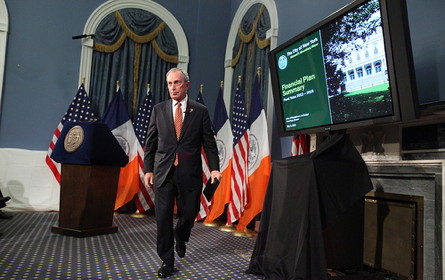
Mayor Michael Bloomberg presents his 2013 executive budget on May 3. Photo by Spencer T. Tucker.
NEW YORK – The Campaign for Children, a coalition that came together this year to fight millions in proposed cuts to public funding for child care and after school programs, has been holding budget vigils on the steps of City Hall since the beginning of June.
It is the kind of scene typical of the “budget dance” that goes on this time of year, when the City Council and Mayor Michael Bloomberg’s administration negotiate the city’s spending priorities for the next fiscal year -- and advocates rally to bring pressure on policymakers to spare their programs from being cut.
An agreement on the budget could be announced as early as today, though the sticking points between the two sides have been significant: besides proposed cuts to child care and after school programs, 20 fire companies could be closed and funding for libraries slashed.
“You plan on doing everything that you like to do, and then the reality brings you back, and then you do only part of what you would like to do,” Bloomberg said during a news conference May 3 to announce his proposed $68.7 billion executive budget.
A new budget must be in place by July 1, the beginning of the fiscal year.
Katherine Eckstein, the director of public policy for The Children’s Aid Society and a member of the Campaign for Children, said the cuts being proposed by Bloomberg would be devastating for child care and after school programs that families depend on.
“These cuts are affecting New Yorkers who are already struggling,” she said recently while standing on the steps of City Hall.
Fiscal policy experts say the budget dance has become little more than a choreographed show.
The mayor initiates it by proposing a preliminary budget sometime around the middle of January that includes many cuts to programs often dear to the Council’s constituents. The Council then undertakes a round of hearings on the proposal, publishing a preliminary budget response in March.
The mayor then responds with his executive budget, which is followed by another round of Council hearings that ended this year in early June. Then negotiations begin, steered by the budget teams of both sides, culminating in an agreement and vote by the Council.
The Council has the authority to restore some funding cuts proposed by the mayor for one year at a time.
Doug Turetsky, of the Independent Budget Office, said the process directs “the Council's attention to restoring funds for existing programs that the mayor knows are very popular in the council member's neighborhoods. So they have less ability to focus on maybe some new initiatives that they want to undertake.”
Maria Doulis, the director of city studies for the Citizens Budget Commission, said it also keeps the city from debating structural changes to municipal fiscal policy.
“Instead of looking at restoring some of the spending on these programs for one year, the Council should really focus on spending items that are growing at a fast pace," she said, adding that the city’s capital spending and health insurance costs in particular should be scrutinized.
For their part, the mayor’s office and Council point to on-time budgets in recent years to demonstrate that the dance, while imperfect, does the work.
The mayor’s executive budget closes a $3.6 billion fiscal year gap with one-time sources of funding, including $466 million from the CityTime fraud settlement and $1 billion in anticipated sales of taxi medallions to expand hail service to the outer boroughs.
It also redirects $1 billion from the Retiree Health Benefits Trust, meaning future taxpayers will have to float the cost of retiree health benefits.
Budget experts have warned the decision to rely on the one-time sources was risky.
The state comptroller’s office, which is one of four agencies that has oversight of the city’s finances, said the “largest quantifiable budget risk” was the anticipated $1 billion that is expected to be raised from the sale of 2,000 taxi medallions. The state comptroller’s office urged the city to “develop a contingency plan” if the money were not raised.
The sale of the medallions has been held up in court. Earlier this month, a state judge agreed to an injunction after yellow taxi fleet owners sued, arguing that the plan violated the state constitution because it was passed in Albany instead of in the City Council.
Bloomberg said at the time of the judge’s decision earlier this month that the consequences of not receiving the expected revenue from the sales of taxi medallions would be “very serious.”
There are other risks to the budget. Experts have highlighted that while the city has regained jobs lost during the Great Recession, the city’s reliance on the financial sector could pose a danger given the economic uncertainty in Europe. The city’s comptroller office called the European debt crisis “a primary threat to both the U.S. and local economies.”
Upon the release of the mayor’s executive budget, the Council said it was particularly worried about cuts being proposed to city-subsidized child care and after-school programs.
The Campaign for Children said 47,000 children would lose access to the programs under the cuts, particularly in neighborhoods with high rates of poverty, unemployment and obesity.
Speaker Christine Quinn, in a statement at the time the executive budget was released, calling the cuts “unacceptable” and that they were “being implemented in ways that create tremendous disruptions for families, communities, and providers.”
Turetsky, of the IBO, said that even though the programs are perennial losers in the budget, this year would be particularly complicated because the are undergoing structural changes.
“The cost per kid would be higher under the new format,” he said. “Even if the funding gets restored, it's not clear you would have the same number of kids being able to take advantage of the programs.”
NYCC: Whistleblower bills passed
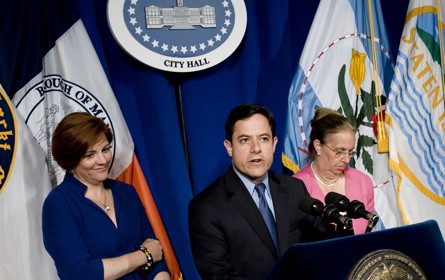
Councilman Daniel R. Garodnick talks about whistleblower legislation passed by the Council.
Photo by William Alatriste, courtesy of the City Council.
Photo by William Alatriste, courtesy of the City Council.
Editor's Note: This version has been updated to clarify that the Department of Investigation had opposed an earlier draft of the bill.
NEW YORK – The City Council wants to encourage employees of contractors doing work on city-funded projects to report corruption and fraud.
Legislation passed by the Council at its stated meeting yesterday would extend protections against retaliation under the current city Whistleblower Law to employees of contractors and subcontractors. Currently, the law only protects city workers.
At a news conference held before the vote on the legislation, City Council Speaker Christine Quinn called whistleblowers “courageous individuals who often end up being the most important source for uncovering fraud and corruption.”
The bill to expand the Whistleblower Law, which would apply to contracts worth over $100,000, was one of three pieces of legislation passed by the Council that would expand protections for workers who report corruption and encourage others to do the same. The bill was authored by Councilman Daniel R. Garodnick, of the 4th District, in Manhattan.
The second bill would require city contractors to post information about whistleblower protections and instructions on how to report misconduct or fraud. The third would renew the city’s False Claims Act, which offers whistleblowers proceeds of funds recouped from successful corruption prosecutions if they report information about potential fraud. All three bills would need to be signed into law by the mayor.
Citizens Union, which publishes the Gotham Gazette, lobbied for the legislation.
The city’s Department of Investigation, which investigates allegations of city-government misconduct including complaints brought by employees of private contractors, opposed an earlier version of the bill because it would have mandated that DOI investigate every complaint of retaliation by private contractor employees.
At a hearing on April 16, DOI said such a requirement would likely lead to "an avalanche of mandatory investigations” that it did not have the resources to address.
The final version of the bill allows DOI to investigate the initial claims of fraud, but does not require the agency to investigate allegations of retaliation. Instead, the person alleging retaliation would be able to file a lawsuit.
The city’s False Claims Act has been used “relatively infrequently since its enactment in 2005,” according to a report by a Council committee that convened April 16. Of 23 civil complaints under the FCA since 2005, the city Law Department decided not to pursue any action in 17 cases. Thirteen of the 17 cases were declined because they involved Medicaid funds, the report said. Under federal law, any recovered funds would go to the state, not the city.
“As the law gets better known … more people will use it,” said Councilwoman Gale Brewer, the chair of the government operations committee, which released the report.
Councilman Garodnick, who attended yesterday's news conference and authored the bill requiring contractors to post notices at job sites about whistleblower protections, said if passed it would go a long way toward informing people about the False Claims Act.
NYC Council passes banking bill
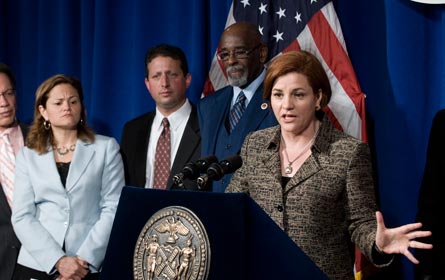
Photo courtesy the City Council
.
NEW YORK – The New York City Council passed a bill requiring banks receiving billions in municipal funds to detail their lending practices, including mortgages and foreclosures, in struggling neighborhoods.
The bill, passed at yesterday’s stated meeting, highlighted the brewing conflict between powerful members of the City Council and the mayor’s office over the role of the government in the economy.
Mayor Michael Bloomberg said the banking bill was unrealistic. "Nobody would argue, I would think, that the city has the expertise or the resources to try to regulate the banking industry," he said. "It is just ridiculous.”
Some of the country’s largest banks, including JPMorganChase and Bank of America, are currently designated as depository banks by the city. Several other cities have enacted or are considering similar ordinances. The Los Angeles City Council passed its own so-called “responsible banking” act yesterday.
New York City Council Speaker Quinn said the bill was not aimed at creating a local regulatory framework. Instead, it was about making sure banks “act in a transparent way” and report information to the city of New York on what banks are doing to help neighborhoods and small businesses.
Councilman Albert Vann, the main sponsor of the bill, said lawmakers spent the last two years working on it and had consulted with the industry. “It is not an anti-bank bill,” he said. “Our objective in pursuing this legislation was to create a process that better informs New Yorkers about the banking needs of the neighborhoods and how to begin to meet those needs,” he said.
The bill passed by the council, which the mayor has threatened to veto, would create a new eight-member Community Investment Advisory Board that would collect and assess information from banks on their lending practices in local neighborhoods.
Supporters of New York City’s banking bill, including Quinn’s previous employer, the Association for Neighborhood and Housing Development, argue it will help policymakers make better decisions about where the city’s money is deposited and encourage banks to invest in communities.
Currently, the Department of Finance, which has also objected to the bill as too burdensome, oversees the city’s money, in conjunction with the city comptroller and the Banking Commission. The commission approves or denies applications from financial institutions seeking to do business with the city.
The City Council also sparred with the mayor over its decision yesterday to override his veto of a “prevailing wage” bill that would raise the wages earned by some workers employed by companies that receive city subsidies.
“In this day and age, this is not appropriate legislation if we want to get companies to come here and build this city,” he said yesterday. His administration has vowed to sue to stop the law from being enacted.
City Council Speaker Christine Quinn said the prevailing wage legislation was reasonable. "The vast majority of us at the City Council believe that when businesses decide of their own free will to take city subsidies or take a high level of city tenants, it is appropriate for us to put a fair additional wage requirement on them,” she said before the council voted to override the veto.
The Council also passed two resolutions at the stated meeting: one calling on the state Legislature to pass a law increasing the minimum wage from $7.25 to $8.50 an hour; the other appealing to Village Voice Media to reject adult advertisements on its Backpage.com website after allegations that sex-traffickers have been using it.
Quinn Presses Ahead on Living Wage
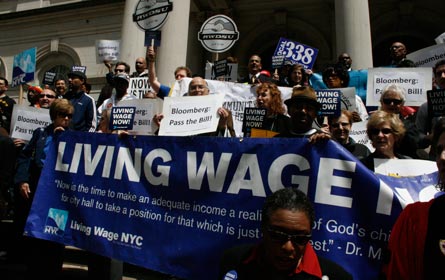
Photo by Jane C. Timm
Council Speaker Christine Quinn is determined to keep politics polite — even if that means storming out of a press conference.
At a rally for the Living Wage legislation, Quinn declined to give her prepared remarks and excused herself after hearing a protester call Mayor Michael Bloomberg “Pharaoh Bloomberg” because he plans to veto the bill and has threatened to take it to court.
Turning around to face the crowd, Quinn demanded for an apology and was met with silence. “Democracy gives everyone the right to have differing opinions, and I’m not going to participate in name calling,” she said before leaving City Hall steps amidst boos and puzzled looks.
The Living Wage bill, which raises minimum wages for jobs in projects that are subsidized by the city, marks the Speaker’s latest and strongest stand against the Mayor as she leads up to her expected mayoral candidacy.
Battling for Fair Wages, Political Office
Advocates of a Living Wage have been fighting for the bill for over two years. Quinn’s support, which was only just garnered earlier this month, required a significant round of edits to obtain — particularly ensuring that only owners and not tenants in projects subsidized would not be required to pay higher wage. In the end, Quinn’s office estimates the legislation will only affect an estimated 600 workers a year.
Bloomberg has expressed unwavering opposition to the Living Wage bill and said last week he would veto the bill and take it to court, when he vetoed another fair wages bill that would have boosted minimum wages for employees in buildings where the city subsidizes the project or leases the majority of office space.
Under Quinn, the Council has overridden just 15 mayoral vetoes in the six years since she was elected Speaker. Three of those overrides have come in the last five months and yesterday’s bill, along with the other fair wage bill passed last month, will add another two to the tally.
Just as today’s legislation marks the Council and Quinn’s latest stand against the Mayor as she prepares to run for the office he's held for the last three terms, the Speaker’s outburst seems to reflect Quinn’s efforts to preserve her long-held relationship with the Mayor and his supporters.
Commenting later on her outburst, Quinn said that she felt strongly that government needed to be “civil, not personal. And that doesn’t involve name-calling.”
Quinn and the Mayor’s relationship has often been criticized for being too close, but Quinn said yesterday that much of her success has come from the pair’s “commonality and civility,” on issues like passing each year’s budget. “I’m very proud of my record — the part where we agree and the part where we don’t agree.”
The Impact
Though the day’s headlines will go to Quinn, the bill’s passage is quite personal and important for 29-year-old Kimberly Ortiz and her two children.
The bill would raise the hourly wages for jobs created in city-funded developments to $10 an hour with health benefits or $11.50 an hour without them. Studies show that that is what New Yorkers need to earn to stay out of poverty. The current minimum wage of $7.25 an hour forces many people who work to live in poverty, the bill’s advocates say. The requirement only would apply to future jobs in developments, such as shopping malls, that received a tax break or other subsidy from the city.
Ortiz has worked for the last five years at the Statue of Liberty’s gift shop making just $9.25 an hour. She has struggled for years to support herself and her two children, using food stamps to make ends meet and forgoing visits to the doctor because she can’t afford it.
On the steps of City Hall, Ortiz was cheerful and excited.
“This is the first time in a long time that I’m not angry on these steps,” Ortiz said. “Mayor Bloomberg calls this bill a job killer and all I have to say is that jobs that keep people in poverty should have died a long time ago.”
Bloomberg's Budget Avoids Teachers Cuts
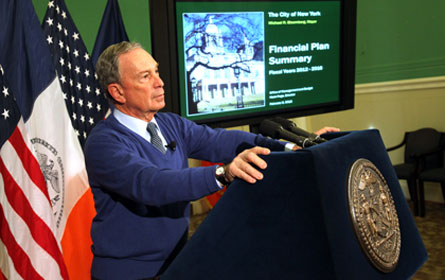
Photo provided by Office of Mayor Michael Bloomberg
The mayor’s $68.7 billion preliminary budget released last week spares teachers and uniformed employees from additional cuts and won’t raise taxes. However, funding for many other programs will shrink to accommodate growing pension and health care obligations.
Programs targeted for the biggest cuts include after-school, child care, libraries and cultural centers, programs which have faced the chopping block many times in the past but have enjoyed protection from council members. The financial plan also proposes closing twenty firehouses across New York City.
The mayor called his plan “a responsible budget that continues to make responsible spending cuts, while protecting the core services and investments.” He added “Cities across the country have struggled to keep their heads above water – laying off teachers, police officers, or firefighters…we’ve avoided those painful steps.” Last year, the mayor considered laying off 4,000 teachers. New York State pays only 39 percent of the city’s education expenses.
Councilman Domenic Recchia, the chairman of the city council’s finance committee, said that the plan was “not as bad as we thought it was going to be” and that it was balanced and fiscally responsible. However, he said, the council will push against cutting $74 million from libraries and $40 million from cultural institutions.
Public Advocate Bill De Blasio also criticized the mayor on cutting child care and after school programs, which he had repeatedly supported in the past. Cutting these programs could wreck many parents’ working schedules, potentially endangering their jobs and putting their children in uncertain situations, he said. The cuts would also affect employment in the day care sector.
“Living within our means must be our top priority. But we cannot stop investing in our future. This is why I am disappointed the Mayor put forth a budget proposal that hurts New York’s children and makes it harder for families to work,” said De Blasio.
Some council members, including De Blasio and Council Speaker Christine Quinn also opposed plans to shutter 20 fire houses, which they deem essential to public safety. A spokesman for the fire department said that the proposal is undergoing review and it’s too early for the department to comment on any specifics.
Last year, many of these programs faced cuts as well but the city council wrangled a concession to keep most of them, adding $300 million to the budget.
The city ran into an approximately $2 billion budget deficit this year, which it balanced through revising calculations for pension liabilities, using some of the previously reserved surplus and the sale of new taxi medallions. In a year, the gap is expected to grow to over $3 billion.
Most of the rising costs come from pension and health care. Citywide, pension costs were equivalent to 66 percent of salaries and wages while in the uniformed workforce, pension costs already exceeded the cost of salaries and wages. By 2013, pension obligations will be 500 percent higher than they were in 2002, at $8 billion.
“Pensions are leveling off but at a high level,” said Doug Turetsky, communications director with the Independent Budget Office. “Which squeezes out other spending we might want to do on other programs and services.”
Turetsky added that health benefits are another major area of cost growth and that even though medical inflation is down, it continues to have a strong effect on the city’s economy.
Even though New York City gained back 65 percent of its jobs to the country’s 36 percent, its rebound is sluggish. Uncertainty in the Euro zone hit the returns on pension investments and the financial sector, which contributes about 10 to 20 percent of the city’s tax revenues didn’t add any jobs. Most of the city’s job growth has been in low-income positions. The residential real estate market remains very slow, which slows construction and drives down property tax revenues.
Commercial real estate is doing much better, with only a 9 percent vacancy rate and office space sales at their decade highest, according to Recchia. The city’s tourism industry is also booming, having attracted a record 50.5 million visitors in 2011. Many hotels are operating at full capacity.
Under the plan, the mayor proposed raising capital expenditures by $700 million over the next five years, to total $39.4 billion. Part of that would go towards the construction of the new NYCTech campus for Cornell University on Roosevelt Island, which is expected to provide 30,000 permanent jobs and create 600 spin-off companies.
The financial plan will go through agency hearings in March, when many programs will fight to lose as little as possible. But the overall sense among council members is that the plan, while not all desirable, is less painful than the budgets of previous years.
“Today’s Preliminary Budget, following on the Governor’s proposed Executive Budget last month, gives us all hope that the worst effects of the economic downturn are finally starting to pass,” said Recchia.
Bloomberg Takes Out a New Budget Playbook
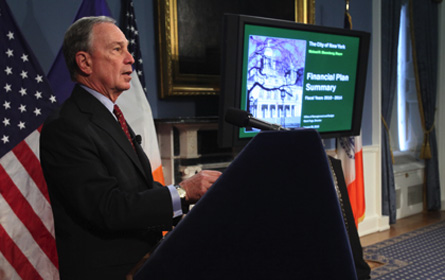
Spencer T. Tucker
Last month, Mayor Michael Bloomberg fueled what Paul Krugman has described as "a recurrent fantasy about a Bloomberg third-party candidacy that will save America" when he presided over the convention of new political group dubbed No Labels.
"No Labels," of course, implies a nonpartisan, non-ideological effort, but, whatever progressive positions Bloomberg holds to on social issues, the mayor's fiscal strategy over the last three years has come from a standard conservative political playbook: reduced services -- especially in education and human services -- criticisms of city unions, expanded privatization and regressive tax policy. In his State of the City speech on Jan. 19, Bloomberg reiterated these positions. He called for smaller government. He took aim at public employee unions, pledged to chip away at seniority privileges and scale back pensions. And he vowed not to raise taxes.
The speech came only days after the City Council, having gotten some items restored, signed off on Bloomberg's latest budget-cutting modification, his ninth in the past three years. A substantial 10th slice is likely with the release next month of the preliminary budget for fiscal year 2012. What these serial budget cuts make clear is that New York, once a laboratory for national liberal policies, is conducting an experiment in urban conservative policy.

The current strategy is very much at odds with that of the first-term Bloomberg administration. The mayor's response in November 2002 to the fiscal crisis following 9/11 and the accompanying recession did resemble a" No Labels" strategy. For instance, its emergency $6 billion budget-cutting plan was split equally between much higher taxes and service reductions. It was nonpartisan and apolitical, based on shared sacrifices from all New Yorkers.
The City's Fiscal Condition
The focus on cuts in education and human services next year looks premature in terms of the city's actual fiscal condition. According to the Independent Budget Office's December Fiscal Outlook, New York City is in surprisingly good shape. It has lost fewer jobs than projected, and increased city revenues, not acknowledged in the city's November plan, will add $525 million to the current fiscal year budget, $790 million in fiscal 2012, and an average of $2 billion in each of the following two years.
That helps create a $1.7 billion surplus this fiscal year and shrinks the city's projected budget deficit for 2012 to $1.1 billion -- a nominal figure at this date in a projected $67.5 billion budget. It also reduces the city's projected deficits for 2013 and 2014.
The Independent Budget Office's forecasts are a reminder that the city, in spite of billions of dollars in budget reductions, is reducing the pace of growth of spending, not actual spending. From 2011 to 2014, city spending (including state and federal funding) will grow from $65.1 billion to $74.6 billion. Admittedly the city still does not know m=how much the state will reduce its funding for schools and general aid. That, the Independent Budget Office, concedes, is a wild card in its predictions.
The IBO projections, indeed, are more optimistic than those of state and city fiscal monitors. The State Financial Control Board December staff report on the November modification makes the bleakest, worst-case projection. It finds the fiscal 2012 deficit could reach $3.9 billion, with markedly higher amounts in later years.
Managing Deficits: Privatization
In his latest effort to reduce the deficit -- whatever its size -- Bloomberg has increasingly underscored another conservative strategy -- privatization. The new deputy mayor for operations, Stephen Goldsmith, the former mayor of Indianapolis, is famous for privatizing city public services. His first public action, a published review of several city agency programs offered a rather blunt critique of current Bloomberg administration practices, but promised a $500 million savings with better management over the next four years.
Since then, the management news has not been so good, and Goldsmith has much to attend to beyond his role in the snow snafu in December.
One goal of privatization is saving money. In some cases -- most notably the CityTime payroll management project, which is more than 10 times over budget -- this goal clearly has not been met.
Yet concerns about contracting practices are nothing new. City Limits magazine, for instance, recently noted that it identified problems with the CityTime contract more than two years ago. It also quoted Lillian Roberts, executive director of the city's largest public employee union, DC37, as saying that the federal indictments in that case are "merely the tip of the iceberg and an outrageous example of the greed and corruption that are the result of an unregulated procurement process."
The city's efforts to upgrade and modernize its 911 emergency response system have been plagued by cost overruns and missed deadlines, with the city removing one contractor and in the midst of trying to get its money back from another. Last month City Comptroller John Liu rejected a $286 million contract for another 911 project.
The Daily News has been investigating the Department of Education's use of consultants and reported in January that, between 2008 and 2010, the department spent some $200 million on consultants. In 2010, more than 100 consultants got over $100,000 each, and close to two dozen received over $200,000.
The Independent Budget Office, which is doing a series of studies of the department, reported in a December blog, "What is Yellow and Rises at the Same Time it Falls," that school transportation contracting costs will exceed $1 billion this school year. In the last five years, it found, costs have risen by $115 million while ridership has fallen. Some reasons for the increase are unclear although non-competitive contracts and fewer contractors may be factors, along with higher gas prices.
City Comptroller John Liu added to the questions surrounding contracting with an announcement in November, entitled, "Trim Fat Around City Contracts Before Resorting to Layoffs and Service Cuts" that cites "$157.4 million in potential savings through audits of city agencies."
Education and Social Services Cuts
While private companies and organizations still get city contracts, some groups are being asked to bear the brunt of the city's budget problems. Over the past eight years, the administration's concept of sacrifice has narrowed considerably. The city comptroller's December report on the city's economy and finances, for instance, notes that the city’s budget cutting -- almost $600 million this year and over $1 billion in 2012 -- is nearly 90 percent service cuts and 10 percent new revenues.
According to the state comptroller's review of the November budget plan recently approved with some modification by the City Council, those cuts "would fall hardest on the city's schools and the neediest citizens." The city comptroller points out that cuts in education total $670 million over the 2011 and 2012 fiscal years and that the number of teachers is scheduled to be reduced by 5,398 in 2012, nearly 4,000 by layoffs and the balance by attrition. Teachers would represent 70 percent of all headcount reductions in city departments in 2012. (In contrast, there will be no reduction in uniformed police officers.)
The Mayor's Management Report gives little information about the impact of nine rounds of cuts on human services. But the four-year plan of the November modification is pretty clear about Bloomberg administration priorities: Over the next four years, children's services would be cut by nearly 6 percent, homeless services by 6.6 percent, and health and mental hygiene by over 7 percent. During this time, housing and libraries would lose 23 percent, cultural affairs 29 percent, and youth and community development 33 percent.
Labor and Deficits
More than anything, else, though, the mayor plans to rely on pension reductions and labor concessions to rein spending. In his State of the City speech last week, he laid out a number of proposals for accomplishing this, including raising the retirement age for future non-uniformed city workers to 65, getting rid of a bonus for uniformed workers and allowing the city to negotiate pensions with the unions, something currently barred by state law. Bloomberg pledged not to approve any salary increases for city workers "unless they are accompanied by reforms in benefit packages that produce the savings we need to continue making investments in our future and protecting vital services."
That reflects what already was in his November plan. After several years of annual 4 percent increases, the mayor drew a line in the sand and said the unions will self-fund any raises, through productivity savings and/or benefit concessions.
Much of the uncertainty about future budget deficits comes from the unresolved negotiations with the city's unions. Contracts for a number of unions -- DC37, the police and firefighter unions, and the Communications Workers of America, which together represent nearly 50 percent of the workforce -- have already expired. According to the state comptroller, raises at the projected inflation rate would cost over $1 billion a year.
Further, the mayor has long delayed any settlement with the teachers and supervisors unions, who have been working without a contract. At stake in any final deal is, according to the city comptroller, nearly $900 million in this fiscal year and $800 million to $900 million in each of the following three years -- none of which is included in the November modification.
The new pressure on city labor echoes a national argument by many governors, including New York's Andrew Cuomo, that public-sector workers are over-compensated, and that taxpayers can no longer afford early retirement ages, rising pension costs and health plans that strike many who work in the private sector as generous. But Michael Powell in a recent New York Times article wrote, "A raft of recent studies found that public salaries, even with benefits included, are equivalent to or lag slightly behind those of private sector workers." (He did not offer figures for New York City alone.)
Read His Lips
Perhaps the most significant indication of the mayor's recent shift to conservative political strategies is his rejection of income tax hikes. During the 2002 fiscal crisis, the mayor raised average property tax rates by 17.5 percent and temporarily increased personal tax rates for higher income people for three years, much as Mayors David Dinkins and Rudolph Giuliani did in the 1990s. Bloomberg also instituted a three-year, temporary sales tax increase.
The average property tax remains the same in 2011 (market valuation increases, however, have raised assessments, thus raising actual tax bills). The regressive city sales tax, recently raised to 4.5 percent, is at a historic high. The higher personal income tax rates on wealthier New Yorkers, however, reverted to lower rates in 2006, although the Independent Budget Office found no evidence that anyone left the city because of the tax increase -- one argument used by the mayor to explain his refusal to re-introduce higher rates.
The mayor has vowed to continue his no tax increase policy. "Let me be clear," he said in his State of the City speech, "we will not raise taxes to balance the budget." Increasing taxes, he said, "would undermine our recovery by driving people and businesses to lower-tax cities and states and deterring investment from overseas."
This decision not to raise taxes on the most affluent New Yorkers takes hundreds of millions of dollars off the budget table. The Independent Budget Office's Budget Options report last February noted that a modest tax rise -- still lower than the 2003-2005 rates -- on high-income New Yorkers would raise almost $500 million in 2011 and $678 million in 2013, approximating the education department cuts in 2011 and 2012. The rates would affect only the 8.4 percent of taxpayers with adjusted gross income over $125,000, who would pay an average of $9,500 more than they currently pay.
But the appeal of tax cuts for high-income taxpayers, as seen in the two-year extension of the Bush federal tax cuts for the nation's wealthiest, seems to outweigh any argument for shared sacrifice. This persists in spite of the fact that that, according to Citizens for Tax Justice, "the combined taxes levied by federal, state, and local governments in the United States are among the lowest in the developed world."
Incidentally, Citizens for Tax Justice reports that the extended personal income and new estate tax cuts in the December compromise will mean an average tax break of $120,726 for the top 1 percent of New York State taxpayers, those with an average income of $2.3 million. They will receive 43 percent of the total tax cut in New York State, while the average benefit for the 20 percent of New Yorkers with the lowest incomes, averaging $11,975 a year, will be $182.
Across the country and in New York City, these actions -- fewer human services, attacks on labor, lower taxes, privatization, growing inequality, less shared sacrifice – are the ingredients on a familiar political label: conservatism. Perhaps we should address -- rather than deny -- political labels, so that we can better understand what is happening.
Glenn Pasanen, who teaches political science at Lehman College, has been in charge of Gotham Gazette's finance topic page since 2001.




